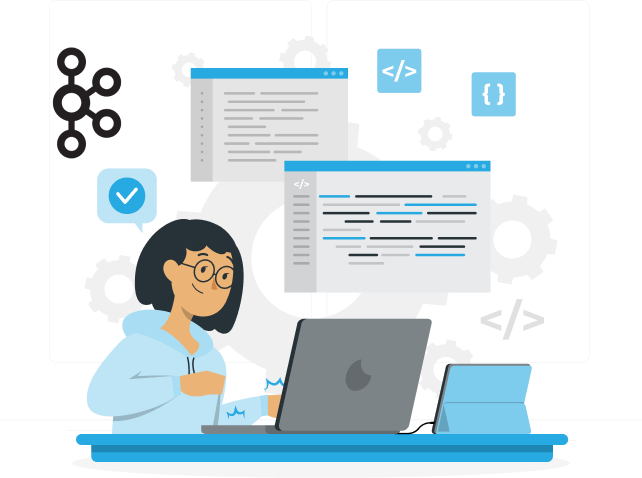Python has gained rather quick success in the end as one of the top languages for web development. Traditionally used for data analysis, automation, and the whole smorgasbord of machine learning uses, its ecosystem of web development frameworks and libraries has turned it into the main language for generating full-fledged, scalable, and efficient websites. Whether you are a beginner or an experienced developer, Python has a lot to offer in terms of making web development smooth and efficient. In this blog post, we are going to explore the benefits of using Python for web development, popular Python frameworks, and real-world use cases.
Why Use Python for Web Development?
Since readability and ease of use are also among the central design philosophies behind Python, it is especially suited for development of web sites. It can write clear code and concise to speed up time to develop it and make the code easier to maintain. These are some of the reasons Python is a fantastic language for websites development:
1. Simple and Clean Syntax
The syntax of Python is simple and natural language-like, making it user-friendly for beginners. For web developers, this means that they can quickly pick up Python and start building websites without dealing with complicated syntax. Moreover, the code of Python is easy to maintain and scale, thus providing long-term sustainability.
2. Extensive Libraries and Frameworks
Python has extensive libraries and frameworks, which streamline the process of web development. It handles repetitive web development work, such as URL routing, authentication, templating, and data validation, and leaves most of the developers not to do that work manually.
3. Scalability and Flexibility
The project, no matter the size, supports scalability; this means it’s suitable for small personal blogs as well as a large e-commerce website. In Python, it is modular; you can easily scale an application. So if your website gets bigger and larger, it won’t become cumbersome to have Python handle traffic, complex features, and the whole system perform in a reasonable way.
4. Large and Active Community
With one of the largest communities of developers, you will find all the support that you need when you have problems. From extensive documentation online to forums and code repositories such as GitHub, Python’s active community is there for developers staying on top of best practices and troubleshooting techniques.
Popular Python Frameworks for Web Development
Python’s versatility is largely due to its rich selection of web frameworks. Frameworks offer pre-built modules and functions that help developers avoid reinventing the wheel. These frameworks allow for rapid web development and also ensure that the applications are scalable, secure, and easy to maintain. Here are some of the most popular Python frameworks used in web development:
1. Django
Django is one of the most known Python web frameworks. It supports “batteries-included” philosophy, where everything needed to start creating a website- from authentication to database handling and templating- comes out of the box. Django prefers rapid development and clean pragmatic design, that’s why it often deals with big projects.
Use Case Example:
Instagram is a great example of a website built using Django. It utilizes the features of Django to efficiently manage the database and scale up rapidly. Django’s scalability made it easy for Instagram to handle the sudden traffic spikes when the application was growing.
2. Flask
Flask is a light and minimalist framework that has simplicity and flexibility in its root. With this, it does not have built-in features such as Django. Therefore, it leaves developers to decide what tools and libraries they want to use for building it. It is ideal for small to medium-sized projects wherein the developers need total control of the application’s components.
Use case Example:
Pinterest is an example of a website built using Flask. Pinterest used Flask initially to power its smaller and more focused features. This in turn helped scale easier as the platform expanded over time.
3. Pyramid
Pyramid is also a widely-used framework to construct web applications in Python. Highly flexible, pyramid can be used to build any type of applications, whether they are simple or complex. In fact, its “start small, finish big” approach gives it an added edge for people who start by developing small-scale projects and, later on, scale them up without doing the whole rewriting thing.
Use Case Example:
Reddit, one of the largest social media platforms, uses Pyramid for its high-traffic services, as the framework is designed to scale efficiently.
Advantages of Website Development Using Python
1. Full Stack Development
Python’s ecosystem supports the development of both the front and back-end of a website. Although the primary use case for Python has been in backend development, the integration with other frontend technologies, such as JavaScript, HTML, and CSS is seamless. It makes Python one of the full-stack development platforms that can build comprehensive web applications.
2. Speed of Development
Python’s clean syntax and rich set of libraries help developers code much faster, meaning development time will be greatly reduced. This will be especially good for startups or small businesses seeking to get their product to market quickly.
3. Robust Security Features
Security is one of the most important priorities in modern web development. Many Python frameworks like Django come with built-in security features, which include protection against SQL injection, cross-site scripting (XSS), and cross-site request forgery (CSRF). Developers can, therefore, create more secure websites using Python. It also integrates perfectly with third-party security tools to enhance protection.
4. Data Handling and Integration
Data analysis is widely done using Python, and this feature can be utilized during web development. All of these features of data handling with support from libraries such as Pandas and NumPy make it quite easy to integrate with analytics platforms and data-heavy applications. Whether it is for building a dashboard or an e-commerce platform based on personalized recommendations, Python will easily handle complex data processing tasks.
Examples of Real-World Website Development Using Python
Several high-profile websites and applications rely on Python because of its simplicity, scalability, and versatility. Here are a few examples of successful websites built with Python:
1. Spotify
Spotify, the world’s leading music streaming service, uses Python for a variety of purposes, including backend development, data processing, and building recommendation algorithms. Python’s ability to handle large datasets and perform rapid computations made it an ideal choice for Spotify’s complex system.
2. YouTube
YouTube is a Google-owned service, which runs on Python to handle an enormous volume of videos. Python allows YouTube to handle large volumes of user uploads, video metadata, and recommendations with ease. With both Python and Google’s proprietary systems, performance is high, especially during peak hours.
3. Dropbox
Another application built using Python is Dropbox, a cloud storage service. The developers at Dropbox chose Python for its ease of use, rapid prototyping capabilities, and seamless integration with cloud services. Python’s scalability is also beneficial for Dropbox’s codebase as it continues to expand globally.
Best Practices for Website Development with Python
To ensure your website development using python project is successful, here are some best practices to keep in mind:
- Use a Version Control System:
Git should be your go-to version control system for managing code changes and collaboration.
Always follow best practices for securing your website, such as using HTTPS, hashing passwords, and implementing authentication systems.
- Optimize for Performance:
Use tools like Django’s ORM for database management, caching solutions like Redis, and optimize frontend assets to ensure fast load times.
- Modularize Code:
This helps to keep code organized in reusable components for easier maintainability and scalability.
- Implement Unit Testing:
Utilize Python’s built-in testing tools such as unittest or pytest to ensure that your application is robust and free from bugs.
Conclusion
Python has emerged as one of the most popular and versatile languages in the web development world, and its vast ecosystem of frameworks and libraries makes it the perfect choice for building scalable, secure, and efficient websites. From large platform-based applications in Instagram and Pinterest to cloud-based storage services using Dropbox, this language proves it has its niche in web application development. To both beginners and seasoned developers alike, Python stands as a foundation of tools and resources that create an environment helpful for building just the right site you need for your purposes.
Through Python’s frameworks, one can achieve great things in web development with security and best practices, so one can achieve speed, security, and usability on the websites he or she designs.
If you are looking to get started with website development using python, we are here to help you with it. Get in touch with us.

Start a Project with Ajackus











































































